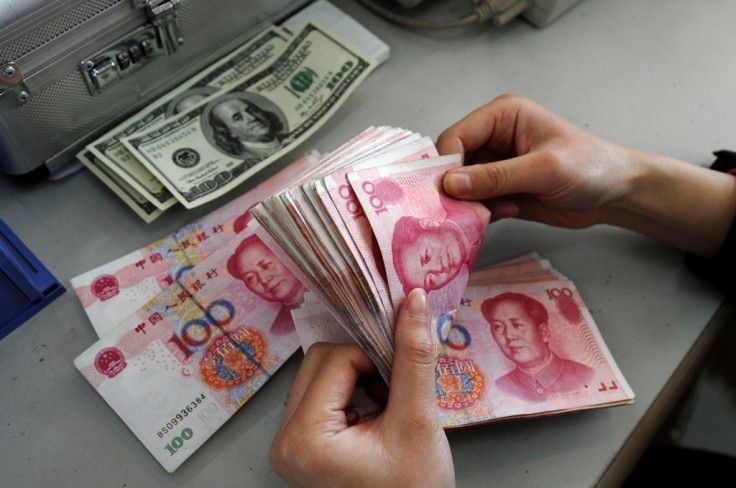China downplays capital outflow as foreign investment banks raise concerns over economy

China's foreign exchange watchdog has downplayed fears raised by foreign investment banks of major capital outflows from the country due to concerns over its weakening economy and sputtering stock market.
Although data released on Thursday (24 July) confirms high net capital outflow in the first six months this year, the State Administration of Foreign Exchange insisted that there has been no "large and continued capital flight so far."
"Despite the deficit in foreign exchange settlement and sales in the first quarter, the situation has become more optimistic since April."
According to official data, Chinese banks bought foreign exchange worth 5.31tn yuan ($855bn, £551bn, €778bn ) in the first half of the year and sold the equivalent of 5.96 tn yuan, resulting in a net sale of 647.4bn yuan. This compares with a 383.8bn yuan deficit in the second half of last year.
Shanghai Daily said that the country's forex reserves fell by just $36.2 bn in the April-June period, compared with a $113bn fall in the first quarter.
Wang Chunying the administration spokeswoman attributed the recent improvement in China's major economic indicators and the increased stability of the yuan as the main reasons for the stabilisation of forex outflow, the Daily said.
She said flows of capital in and out of the country have become more balanced in recent months, despite a high level of volatility in the first half. "There has been no large and continued capital flight so far," she insisted, according to China Daily.
Forex movement normalised in April, May
In a news conference a few days earlier before the second quarter figures were released, Wang Yungui, the administration's director general of the General Affairs Department said that forex receipts and payments had become more balanced in April and May.
"Despite the deficit in foreign exchange settlement and sales in the first quarter, the situation has become more optimistic since April," Wang said.
At yesterday's data release, the administration's spokeswoman blamed the heavy outflow to the appreciation of the dollar, which was one of the most important factors in the first quarter.
Wang said there may be risks from possible hikes in the US Federal Reserve but said this will be "containable."
"Normalisation of the Fed's monetary policy will increase pressure on China's capital outflows, but we are confident we can meet the challenges."
There have been concerns that the heavy capital outflow could reduce liquidity in the domestic market, weaken the yuan and impact economic growth.
She added that the uncertainties arising from the ongoing Greek debt crisis talks may influence China's cross-border capital flows due to the fluctuations in the global foreign exchange markets. This will be closely monitored by the administration, she said.
According to official figures released, China's economy grew by 7% in the first half year-on-year, while exports grew by 2.1% in June, after falling by 2.8% in May, Shanghai Daily said.
Concerns over China's economy
A Reuters poll of analysts expects growth to slow to 6.7% in 2016 versus a 7% growth anticipated for 2015.
Robin Brooks at Goldman Sachs had estimated that capital outflows in China topped $224bn in the second quarter which he described as a level "beyond anything seen historically."
He believes the Chinese authorities sold $48bn of bonds between March and June in a bid to defend the yuan.
"The world is awash with cheap Chinese exports and China has more new housing and infrastructure than its people know what to do with."
Lombard Street Research's Charles Dumas had said that the capital outflows have reached $800bn over the past year, asking when this movement of funds will be called "capital flight" instead of capital outflows.
The research house has said that China's true economic growth rate is currently 4% based on proxy measures of output. Both Capital Economics and Oxford Economics have reached a similar verdict with their own tracking system, the Telegraph reports.
"Actual growth is almost a percentage point or two slower. The stronger-than-expected figure will inevitably spark renewed questions over the veracity of the official data," Capital Economics' Julian Evans-Pritchard said, according to The National Interest.
He highlighted the fact that power output rose by only 0.5% compared to the reported 6.8% rise in industrial production.
Analysts have noted that growth in the first half was propped up by household consumption, which in turn has been artificially and temporarily bolstered by the latest stock market rally.
National Interest also noted that despite the release of the better-than-expected first half GDP data, the Shanghai Composite Index dropped 3% last Wednesday, shrugging off government measures to prop up the stocks.
It also pointed out that the number of vacant homes in China are estimated at double the US level at the peak of the subprime crisis, with GDP data showing property investment rising by only 4.6% in the first half, a stark contrast from the 8.5% growth in the previous quarter.
"The world is awash with cheap Chinese exports and China has more new housing and infrastructure than its people know what to do with. At the same time, the most basic supply-side mechanism of China's growth – the flow of underemployed farm workers from the regions to the factories and construction sites of the cities – is slowing. The country is starting to run short of cheap labour," warned the Australian Financial Review's Alan Mitchell.
He added: "Both China's actual and potential growth rates are slowing, and China's suppliers from Japan and South Korea to Southeast Asia and Australia, are feeling the chill."
© Copyright IBTimes 2025. All rights reserved.






















